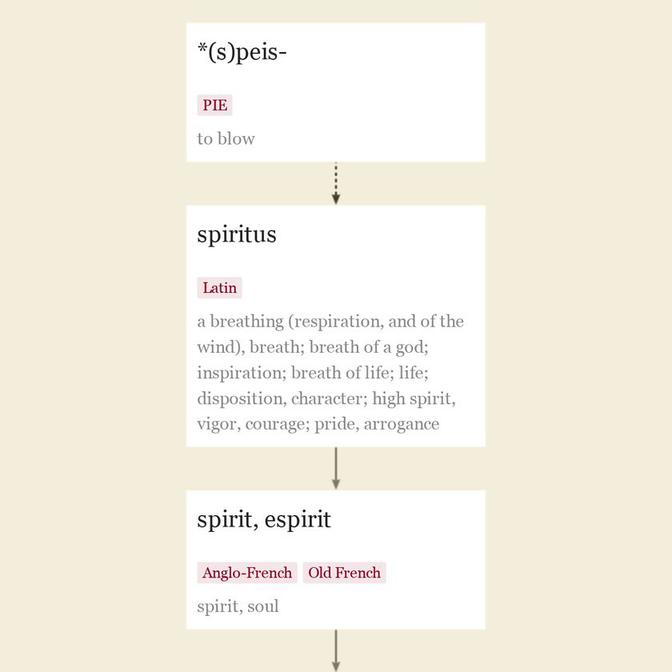conspire (v.)
late 14c., "aspire or plan maliciously, agree together to commit a criminal or reprehensible act," from Old French conspirer (14c.), from Latin conspirare "to agree, unite, plot," literally "to breathe together," from assimilated form of com "with, together" (see con-) + spirare "to breathe" (see spirit (n.)), perhaps on the notion of "to agree (by spoken oath) to commit a bad act." Or perhaps the notion is "to blow together" musical instruments, i.e., "to sound in unison."
Neutral or good sense of "to contribute jointly to a certain result" is from 1530s. Related: Conspired; conspiring.
Entries linking to conspire
mid-13c., "life, the animating or vital principle in man and animals," from Anglo-French spirit, Old French espirit "spirit, soul" (12c., Modern French esprit) and directly from Latin spiritus "a breathing (of respiration, also of the wind), breath;" also "breath of a god," hence "inspiration; breath of life," hence life itself.
The Latin word also could mean "disposition, character; high spirit, vigor, courage; pride, arrogance." It is a derivative of spirare "to breathe," and formerly was said to be perhaps from a PIE *(s)peis- "to blow" (source also of Old Church Slavonic pisto "to play on the flute"). But de Vaan says the Latin verb is "Possibly an onomatopoeic formation imitating the sound of breathing. There are no direct cognates." Compare conspire, expire, inspire.
In English it is attested from late 14c. as "divine substance, divine mind, God;" also "Christ" or His divine nature; also "the Holy Ghost; divine power." Also by late 14c. as "the soul as the seat of morality in man," and "extension of divine power to man; inspiration, a charismatic state; charismatic power," especially in reference to prophecy.
The meaning "supernatural immaterial creature; angel, demon; an apparition, invisible corporeal being of an airy nature" is attested from mid-14c. The word is attested by late 14c. as "ghost, disembodied soul of a person" (compare ghost (n.)). Spirit-rapping, colloquial for spiritualism in the supernatural sense, is from 1852. Spirit-world "world of disembodied spirits" is by 1829.
It is attested from late 14c. as "essential nature, essential quality." The non-theological sense of "essential principle of something" (as in Spirit of St. Louis) is attested from 1680s and was common after 1800. The Spirit of '76 in reference to the qualities that sparked and sustained the American Revolution of 1776 is attested by 1797 in William Cobbett's "Porcupine's Gazette and Daily Advertiser."
It also is attested from mid-14c. in English as "character, disposition; way of thinking and feeling, state of mind; source of a human desire;" in Middle English freedom of spirit meant "freedom of choice." It is attested from 1580s in the metaphoric sense of "animation, vitality," and by c. 1600 as "frame of mind with which something is done," also "mettle, vigor of mind, courage."
From late 14c. in alchemy as "volatile substance; distillate" (and from c. 1500 as "substance capable of uniting the fixed and the volatile elements of the philosopher's stone"). Hence spirits "volatile substance;" the sense of which narrowed to "strong alcoholic liquor" by 1670s. This also is the sense in spirit level (1768), so called for the liquid in the clear tube.
According to Barnhart and OED (1989), the earliest use of the word in English mainly is from passages in the Vulgate, where the Latin word translates Greek pneuma and Hebrew ruah. A distinction between soul and spirit (as "seat of emotions") became current in Christian terminology (such as Greek psykhē and pneuma, Latin anima and spiritus) but "is without significance for earlier periods" [Buck]. Latin spiritus, usually in classical Latin "breath," replaced animus in the sense "spirit" in the imperial period and appears in Christian writings as the usual equivalent of Greek pneuma.
in brief, conceive light invisible, and that is a spirit. [T. Browne, " Religio Medici"]
mid-14c., "a plotting of evil, unlawful design; a combination of persons for an evil purpose," from Anglo-French conspiracie, Old French conspiracie "conspiracy, plot," from Latin conspirationem (nominative conspiratio) "agreement, union, unanimity," noun of action from past-participle stem of conspirare "to agree, unite, plot," literally "to breathe together" (see conspire).
Earlier in same sense was conspiration (early 14c.), from French conspiration (13c.), from Latin conspirationem. An Old English word for it was facengecwis.
Conspiracy theory "explanation of an event or situation involving unwarranted belief that it is caused by a conspiracy among powerful forces" emerged in mid-20c. (by 1937) and figures in the writings of, or about, Charles Beard, Hofstadter, Veblen, etc., but the degree of paranoia and unreasonableness implied in each use is not always easy to discern. The phrase was used from 19c. in a non-pejorative sense "the theory that a (certain) conspiracy exists," especially in court cases. Its use in general reference to theories of hidden cabals pulling wires behind the scenes of national or global events is by 1871.
We shall better understand the ensuing civil war if we study the movements in the four most important of these States, in relation to a theory which asserts that the secession was a conspiracy whose central cabal, composed of Southern senators and representatives in Washington, dictated through its ramifications in the States the inception and the course of the revolution. [James Ford Rhodes, page headed "The Conspiracy Theory" in "History of the United States from the Compromise of 1850," New York, 1893]
To the Jingo Imperialist "the South African Conspiracy" is the alleged Dutch conspiracy to drive the British into the sea. But, to the man accustomed to weigh evidence and to base his opinions on ascertained facts, it is clear that this conspiracy theory is absolutely untenable, for whatever "evidence" has been adduced in support of the theory is nebulous and shadowy in the extreme. ["The South African Conspiracy," in The Westminster Review, January 1902]
Trends of conspire
More to Explore
updated on March 08, 2018
Dictionary entries near conspire
conspectus
conspicuous
conspiracy
conspirator
conspiratorial
conspire
constable
constabulary
constance
constancy
constant

